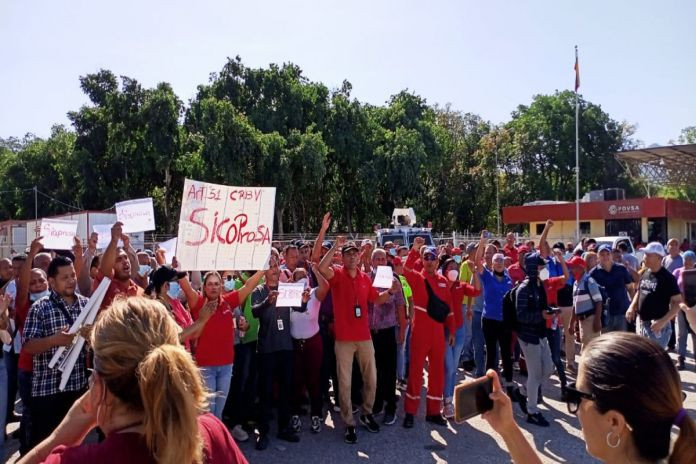By Ricardo Vaz
CARACAS (venezuelanalysis.com) – Dozens of oil industry workers have staged protests in walkouts in recent days to demand improved wages and labor rights.
Since June 1, employees from the Puerto La Cruz refinery in Anzoátegui state, eastern Venezuela, have demonstrated at the company headquarters and other oil industry facilities, as well as taken to the streets.
While the refinery has been the epicenter of the mobilizations, workers and union representatives from other affiliates of state oil company PDVSA have also participated.
José Bodas Lugo, secretary-general of the Unitary Federation of Oil Workers (FUTPV), told Venezuelanalysis that the refinery workers had declared themselves in a “permanent assembly” until they secured a response from industry authorities.
He stated that the protesters demand to be heard by Oil Minister Rafael Tellechea. During a protest at PDVSA’s Eastern Venezuela Refining HQ on Monday they were told that Tellechea is currently in Vienna to participate in OPEC meetings.
“The social and economic reality of the oil industry workers and pensioners is very precarious,” Bodas explained. “Our collective contract expired 18 months ago and there has been no progress to negotiate a new one, and our wages are insufficient.”
According to different sources, PDVSA rank-and-file employees earn between US $100 and $200, though only a small portion is the salary from which other benefits are calculated. In some cases there are extras for night shifts, transportation or at the discretion of specific companies.
Bodas, who hails from the Trotskyist CCURA trade union movement, added that oil workers have seen a number of labor benefits curtailed in recent years, such as the ability to secure mortgages in favorable conditions backed by PDVSA.
The main demand in the ongoing protests has been the reinstatement of the industry’s SICOPROSA health insurance. The FUTPV representative criticized that the company has not followed through on pledges to reactivate the program.
“Right now, only the PDVSA board and top-level managers have access to it,” Bodas complained. “This leaves the rest of the workforce at the mercy of the public healthcare system which is in dire condition.” He lamented that two workers, with decades of service, recently died in state hospitals because of inadequate care.
The SICOPROSA program offered generous healthcare coverage for PDVSA workers and their immediate relatives, allowing them to get free treatment at private clinics throughout Venezuela and even abroad. It was funded by a percentage of workers’ wages as well as separate contributions from the company.
Bodas went on to call on other PDVSA workers throughout the country, as well as the working class in general, to join the ongoing labor mobilizations. He additionally criticized actions to criminalize union leaders as well as efforts to undermine the right to strike.
The Puerto La Cruz demonstrations follow a string of other protests from the Venezuelan public sector and state companies to demand higher wages, the restoration of collective bargaining and other labor rights.
Amidst heavy sanctions that accelerated a heavy economic contraction, the Maduro government adopted a more liberal approach in its bid to stabilize the economy, slowing down wage adjustments and offering advantages for private businesses.
On May 1, the administration raised the minimum income for active public sector employees to $70. However, it did so through non-wage bonuses. Trade unionists claimed that the measures were tailor-made for employers’ interests since they lower social security contributions, vacation pay, severance compensations and other benefits.
The oil sector, the country’s main economic engine, has been hit by wide-reaching US sanctions for nearly six years. The measures have shut PDVSA out of financial markets, blocked exports and even targeted third parties for trading with Venezuela’s state oil company.
The industry has likewise been affected by a brain drain and corruption. A recent probe led to dozens of arrests over alleged embezzlement of at least $3 billion.






